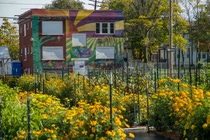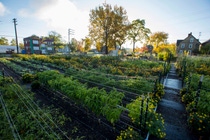Media
Local businesses help establish new community center in Detroit as a model of sustainability
High performance building materials drive efficiency, optimize energy, sustainability
DETROIT, MAY 22, 2017 - Local businesses are helping The Michigan Urban Farming Initiative (MUFI) transform a 3,200-square foot vacant apartment building in Detroit’s Lower North End into a multi-functional community space. The Community Center will showcase innovative planning concepts inside and out, and serve as a model for sustainable development in the heart of MUFI’s urban Agrihood.
“We’re emphasizing efficiency with some of the most sustainable, progressive building products and techniques available today,” said Tyson Gersh, President of MUFI. “The Community Center will serve as an example of how we must reinvent the way we plan our buildings, neighborhoods, and communities. Detroit is in a unique position; we have the opportunity to think sustainably and innovatively about the future of our city.”
“Over the last few years, we’ve seen an increased demand for sustainable products to help feed, house, and transport our growing world population amid increasing societal and environmental pressures,” said Doug Brown, Manager, Sustainability Strategy & Business Development - North America at BASF. “By providing BASF building products to the Community Center project, we will help MUFI address of number of these issues and develop a showcase for sustainable solutions.”
Featuring more than 30 advanced building materials and systems, the structure will be transformed into one of the most sustainable, energy-efficient buildings in Detroit. The goal is to align with the U.S. Green Building Council’s Leadership in Energy and Environmental Design (LEED) standards. Some materials include:
- BASF’s energy-saving insulation materials, including spray foam polyurethane
- Pervious paving materials, such as the strong and durable composite Elastopave®, from BASF
- Impact-reducing concrete admixtures, including BASF’s Green Sense®
- Low volatile organic compounds and mildew resistant paints and coatings from PPG
- Vehicle insulation scrap, repurposed for wall and ceiling insulation from General Motors
- Forest Stewardship Council certified lumber used in structural and flooring repairs
In addition, wood removed from the existing building will be repurposed into furniture and other items throughout. When complete, the new Community Center will be a gathering space for residents and visitors to host seminars, workshops, and educational programs. It will also house a commercial kitchen, and serve as MUFI’s new headquarters.
Other companies participating in the project include BorgWarner; Stanley Black & Decker; Herman Miller; Green Standards; and Weber Shandwick.
The quest to revitalize Detroit’s Lower North End began nearly seven years ago with the development of the adjacent two-acre urban farm. The Community Center project is just one example of MUFI’s ongoing effort to enhance its existing neighborhood and build economic value for the community
Other facets of the three-acre agricultural campus include:
- Urban farm: Over 350 vegetable varieties are grown, providing more than 50,000-lbs of produce since 2012. The food is free to the more than 2,000 households, food pantries, churches, and businesses within two-square-miles of the farm.
- High-density fruit orchard: Detroit's most diverse and dense urban orchard features approximately 200 fruit trees.
- Children’s sensory garden: The garden is an enriched learning environment for children, centered around stimulation of the five senses.
Future Projects Include:
- Healthy food café: Built on a vacant land next to the Community Center, the café will also serve as an event space.
- Student internship housing: When renovated, a vacant four-bedroom home will house interns.
- Water harvesting cistern: MUFI will transform a blighted home into a water harvesting cistern to irrigate the farm and avoid storm water run-off.
- Alternative housing model: A two-bedroom home with full kitchen and bath will be built using a sea shipping container as an example of low-cost housing alternative.
Community Center design and construction is managed by Integrity Building Group of Detroit. MUFI’s urban Agrihood will be featured as a model for sustainable urban planning in the BASF Good Cities Pavilion at Sustainable Brands 2017 global conference, held at the Cobo Convention Center in Detroit, May 22-25, 2017.
For press photos, click on the links below:
https://www.basf.com/press-photos/us/en/photos/2017/05/05-22-17_BASFMUFIProject1.jpg
Suggested caption: Local businesses are helping MUFI transform a 3,200-square foot vacant apartment building in Detroit into a multi-functional community space.
https://www.basf.com/press-photos/us/en/photos/2017/05/05-22-17_BASFMUFIProject2.jpg
Suggested caption: The MUFI farm provides free food to the more than 2,000 households, food pantries, churches, and businesses within two-square-miles of the farm.
About BASF
BASF Corporation, headquartered in Florham Park, New Jersey, is the North American affiliate of BASF SE, Ludwigshafen, Germany. BASF has nearly 17,500 employees in North America, and had sales of $16.2 billion in 2016. For more information about BASF’s North American operations, visit www.basf.us.
At BASF, we create chemistry for a sustainable future. We combine economic success with environmental protection and social responsibility. The approximately 114,000 employees in the BASF Group work on contributing to the success of our customers in nearly all sectors and almost every country in the world. Our portfolio is organized into five segments: Chemicals, Performance Products, Functional Materials & Solutions, Agricultural Solutions and Oil & Gas. BASF generated sales of about €58 billion in 2016. BASF shares are traded on the stock exchanges in Frankfurt (BAS), London (BFA) and Zurich (BAS). Further information at www.basf.com.
P-US-17-051

